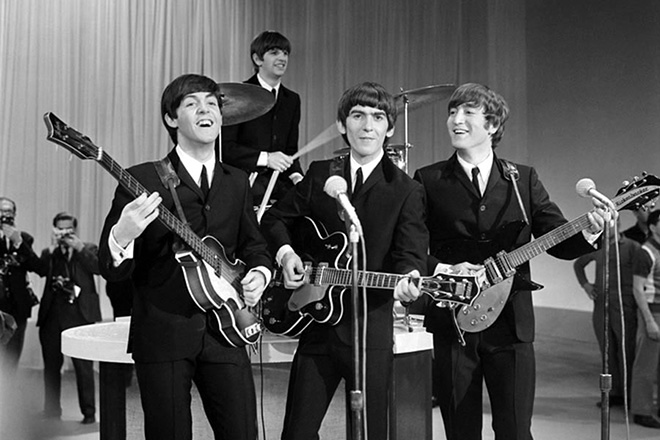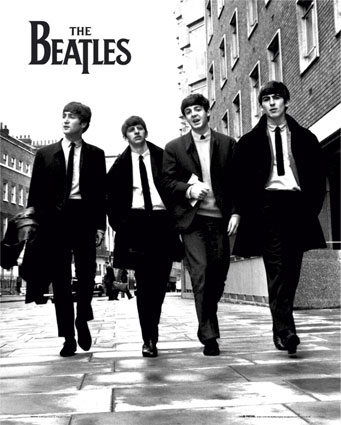 THE BEATLES
THE BEATLES
From Beefy’s Point of View
I’m kind of avoiding Beatles 50th anniversary hoopla.
Big-name commemorative concerts starring multi-genre artists who were born a generation or three later, or even those featuring Beatles contemporaries, I don’t really need to see, so I’ll probably pass on Sunday’s Grammy celebration on CBS. I didn’t watch the CNN special or any of the Letterman tributes. There’s a Beatles fan fest here in New York that I’ll probably skip as well.
I did go to a press preview of the Ladies and Gentlemen…The Beatles! multimedia exhibition celebrating the Fab Four’s arrival in New York 50 years ago this week. It opened yesterday at The New York Public Library for the Performing Arts and runs through May 10.
One of the speakers, who had actually been to a Beatles U.S. concert, prefaced her remarks by noting the Beatles’ haircuts and suits, and how they “seduced” America. Another said how he watched them on Ed Sullivan and went out and got a guitar the next day.
“It changed my life,” he said, “and American culture.”
Obvious and predictable, for sure, but I can’t really add to it. I mean, I remember exactly the first time I heard The Beatles, yeah yeah yeah, like it was yesterday. How joyously startled and stunned I was the first time I heard “I Want to Hold Your Hand.” Yet to this day I can’t really explain why.
But I know someone who can. Beefy!
You may recall that it was Beefy who explained to me the significance of Ronnie Wood’s two bass players—one electric, one upright acoustic—who were in the band he brought, along with Mick Taylor, to the Cutting Room a couple months ago. You may also remember that Beefy’s real name is Robert Kenison, though fans far and wide know him as the great Troy Charmel, guitarist/pianist of the legendary Dr. Bop & the Headliners, the celebrated Midwest rock ’n’ roll show band of the 1970s that famously featured vocalist Al Craven, the White Raven.
But I first saw Beefy in the mid-’60s, when Beefy, then 18, played in a Beatles/British Invasion-inspired band called The Gentlemen—which played at a Van Hise Junior High School dance in Madison, Wis.—wearing Beatles suits like they have at the Ladies and Gentlemen exhibition, of course.
If anyone could explain how—and why—I felt so overwhelmed that first time I heard “I Want to Hold Your Hand” 50 years ago, it would be Beefy!
“I can’t put my finger on it, either!” Beefy said, when I called him an hour after leaving the exhibit. I implored him to give it a try anyway.
“Their voices were so upfront,” he said. “The Everly Brothers sang in thirds, one third above each other. It’s a harmony thing.”
Beefy knows I have no idea what he’s talking about when he starts talking music theory, but he continued.
“The Beatles did that a lot of course, but they also did what they call fifths between their voices: One sings a note, and another is a few notes above—not just a third. In music, it’s called a ‘fifth.’ It’s very powerful, and sounds like a bagpipes’ drone sometimes. Very different.”
I’m sure he was making sense.
“The tricky thing is, they started playing on the upbeat,” Beefy tried to explain, vocalizing the awesome “Do-do-DO! Do-do-DO! Do-do-DO! Neenie-neenie-neenie…” power chord intro of “I Want to Hold Your Hand.”
“Then the handclaps and voices come in, and it all seems off-kilter: You hear the beat, and think they’re coming in on the one, but there’s a delay before they come in! Right off the bat they’re doing things like that that were different. Finding ways to tweak things a little bit. Unbeknownst to listeners, they were starting songs on the upbeat, so it sounded like they were coming in off the beat! And their voices come in and synch up on the ‘Oh yeah, I’ll.’ The whole intro is odd, and you’re going, ‘What is this?’”
Yes, Beefy. I’ve been going ‘What is this?’ now for 50 years!
“Their voices are always really prevalent in those first songs. They sing very high, which is very difficult to sing for the average baritone male singer and yet not sound thin high—not like Michael Jackson kind of high, but thicker and edgier with the English groups. It’s almost a baritone sound, but they’re singing in a tenor range so it doesn’t sound thin—and has a gruff edge to it.”
And there are three voices.
“It’s hard to tell the three of them, because they blended extremely well. Like on ‘This Boy’: McCartney and Lennon and Harrison. It’s hard to tell who’s who. Is Lennon on the bottom? Harrison? It’s just a beautiful blend in the voices, and rhythmically, they were beyond: Lennon’s rhythm guitar was phenomenal! The rapid-fire triplets he plays on ‘All My Loving’ is phenomenal. Or the way he plays background guitar on ‘I Saw Her Standing There’: When they played rock ‘n’ roll, he played these driving backgrounds.”
Beefy pointed out that Lennon’s Rickenbacker guitar was “shorter, almost a three-quarter.”
What the hell?
 “It’s like in a string quartet where you have a viola and cello. They almost had that with McCartney’s violin bass—not a Fender or deep bass, but with a punchier sound that you could hear the notes better than with a standup string bass. You could really hear the bass lines with the Hofner that McCartney played—and he was very inventive with it: That fast-paced bass riff on ‘I Saw Her Standing There’ was really clear and added to the punch.”
“It’s like in a string quartet where you have a viola and cello. They almost had that with McCartney’s violin bass—not a Fender or deep bass, but with a punchier sound that you could hear the notes better than with a standup string bass. You could really hear the bass lines with the Hofner that McCartney played—and he was very inventive with it: That fast-paced bass riff on ‘I Saw Her Standing There’ was really clear and added to the punch.”
“Punch” is the key word, eh, Beefy?
“There was Lennon’s midrange punch with the shorter-neck guitar. George’s Country Gentleman was a more melodic instrument, so they had a different combination of instrumentation that was previously unheard in rock ’n’ roll bands—and then Ringo was way beyond in his sense of feel and time. The things he added were always a little different and right on and with a great feel. I don’t think The Beatles would have been The Beatles without Ringo. He was as important as anything else.”
Not to leave out George Martin.
“Then there was George Martin and the way he recorded them. Early on he was trying to reproduce their live sound, and he really did. Put on ‘I Want to Hold Your Hand’ and it’s still phenomenal! If there had been no Beatles and it came out today with all the harmonizers and synthesizers and electronic drums and over-produced everything, ‘I Want to Hold Your Hand’ would still dominate right away. It sounds live, and it’s so overwhelming!”
“There’s no end to it,” Beefy concluded. “The harmonies, intricate vocal arrangements, key changes, unusual chord progressions—and the lyrics, and the fact that they wrote awesome songs. They did it all, and that’s why they are who they are and will forever be…The Beatles.”
And, I add, nothing that can be topped, let alone approached, by any of the artists on any of the tribute programs over the next week or two.
Jim Bessman



comment closed